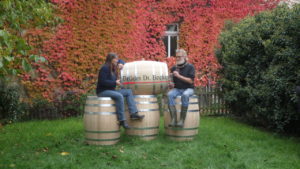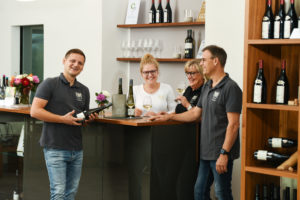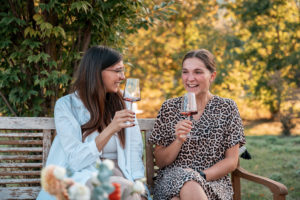Learning from the past
In the mid-19th century, phylloxera, which had migrated from the USA, destroyed huge areas of vineyards all over the world. While American grape varieties were immune, the consequences for Europe and the rest of the world were catastrophic. The grape varieties grown there had no defence against phylloxera. Only a new method, that helped strengthen the root system of the classic European grape varieties by using the resistant American ones, put a stop to the catastrophe. Today we still use that method to protect vines from phylloxera. Therefore, the solution to the catastrophe we are facing today also seems obvious. If the existing grape varieties are no match for the changing climatic conditions, than we have to find new ones.
Fit for the future
The so-called PIWI wines from fungus-resistant grapes are not only very robust, but also require significantly fewer pesticides. This counteracts insect mortality, reduces CO2 emissions and preserves the soil for future generations to come. The initiative Zukunftsweine (wines for the future) wants to communicate the need of those measures to winegrowers as much as to customers. The crossing of resistant new grape varieties with the popular classics could be the key to securing the future of winegrowing not only in Rheinhessen, but also in other threatened winegrowing regions around the globe. Another organization is also committed to sustainability in agriculture. The Fair and Green association developed the FAIR’N Green standard for sustainable winegrowing. In addition to environmental protection and working in harmony with nature, the concept also includes economic and social aspects.
Sustainability – an ongoing process

Decades of commitment, Credit: winery Brüder Dr. Becker
The winery Brüder Dr. Becker in Ludwigshöhe has been committed to sustainability for decades. Lotte Pfeffer-Müller and her husband Hans Müller are the second generation to run the winery. Lotte’s parents started with organic winegrowing in 1978. The winery is the first certified organic winery in the Verband deutscher Prädikatsweine (VDP). That is an association labelling German vineyards, which fulfil high quality requirements. While people ridiculed their commitment back then, today the topic has arrived at the centre of society and organic wines are in tune with the spirit of the times.
Aware of the challenges that await winegrowers in Rheinhessen, the two are already focussing on the fungus-resistant PIWI varieties Regent and Souvignier gris alongside the classic grape varieties Riesling, Silvaner Scheurebe, Müller-Thurgau and Pinot Noir. However, their commitment does not end with the choice of grape varieties. The business itself also aims to be sustainable – starting with the solar panels on the roof to the weight of the glass bottles in the wine cellar.
Last year they got the Great Wine Capitals Best Of Wine Tourism Award 2023 in the “Sustainability in Wine Tourism” category, for their efforts over the past decades.
Standing still means going backwards

Teamwork, Credit: winery Paulinenhof
Ongoing development is the key to successful winegrowing, even in times of climate change. The Bernhard family is convinced that the only way to reach this aim is by working in harmony with nature. They run the winery Paulinenhof in Selzen. At this place, their family practised winegrowing and agriculture since 1790.
The winery bears the Fair’n Green seal for sustainable winegrowing. To be honoured, you must produce wine in absence of herbicides and glyphosate while not using environmentally harmful cleaning agents in the wine cellar. Protecting nature, promoting biodiversity and conserving natural resources are important aspects to get the certification.
These and many others are themes at the regular events held at Paulinenhof. The family always comes up with something new and exciting to entertain their visitors. The winery got the Best Of Wine Tourism Award 2024 in the “Innovative Wine Tourism Experiences” category.
A new generation

Dedicated sisters, Credit: winery Wasem Doppelstück
Julia and Marie Wasem are the owners of the winery Wasem Doppelstück in Ingelheim, which they founded in 2019. They belong to the generation of young and well-trained winegrowers who are consciously breaking new ground in winegrowing. A generation that practices sustainable agriculture out of an inner conviction and invests in modern production methods to create distinctive and expressive wines. They won last year’s Great Wine Capitals Best Of Wine Tourism Award in the “Accommodation” category.
As many other winegrowers in Rheinhessen the two sisters joined the initiative Zukunftsweine. Their heart’s desire: organic winegrowing! Since 2022, they produce their wines exclusively in an ecologically sustainable way. Their wine is vegan and reflect the diversity of the local flavours and soils. “Treating nature with care is the future of healthy plants and good wine.” (Julia Wasem)
Learn more about Mainz | Rheinhessen Great Wine Capital